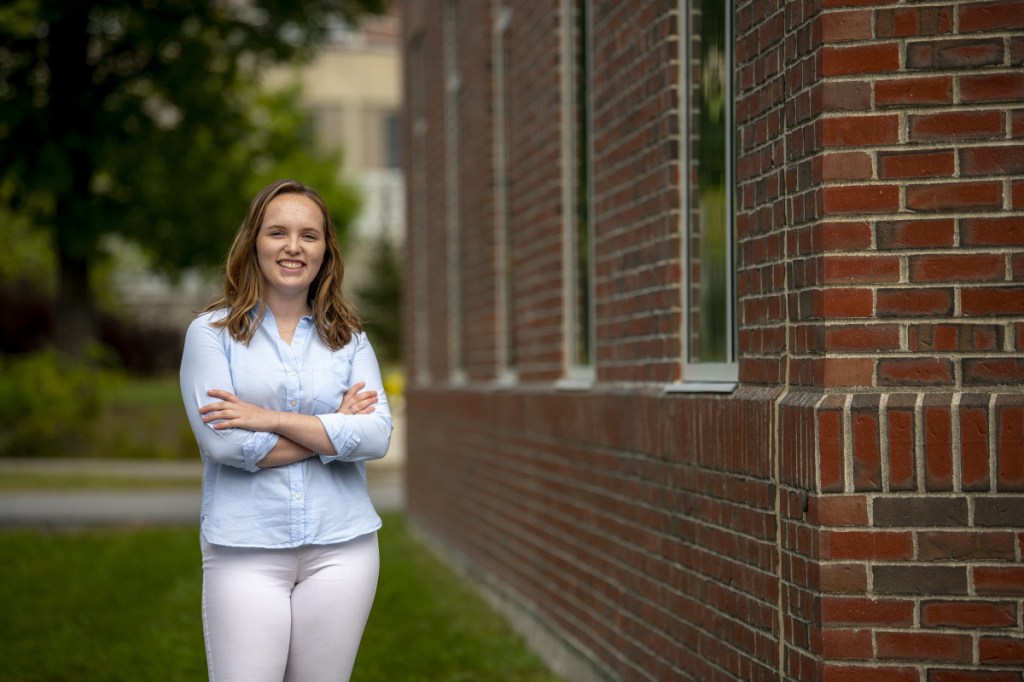The University of Maine system is ramping up a program that’s designed to encourage more young Mainers to attend and graduate from college – and to fill gaps in Maine’s aging workforce.
Known as the Early College program, it allows qualifying high school students to attend college classes online, at their high school or at a nearby college campus. The students get to sample potential career fields and get a better sense of what college is like while they earn college credit.
The program also serves an important workforce development function by making it easier for Maine high school students to make the transition to college and a successful career.
Recent additions to the program include a component aimed specifically at rural students, round-the-clock online tutoring and better coordination among the participating high schools.
“We really want to increase college aspirations and success,” said Amy Hubbard, Early College lead coordinator for the UMaine System.
About 100 Maine high schools now participate in the Early College program, she said. In some cases, college classes are taught at the high schools by teachers who meet certain requirements. In other cases, students travel to the nearest college campus. In addition, many classes are offered online through the program.
Fall enrollment in the Early College program has increased significantly, jumping from about 1,500 students in 2015 to nearly 2,800 students this year, according to the UMaine System. That growth has been driven largely by the new component of the program focusing on students in rural communities.
The rural component, known as Rural U Workforce, offers college-level classes to high-schoolers in five broad study areas: nursing and health care, behavioral science and human services, criminal justice and public safety, forestry, and business. This fall, about 700 high-schoolers enrolled through the Rural U Workforce program.
Through the program, it is possible for high school students to enter college with up to a year’s worth of credits under their belt, although the average number of credits is significantly less than that.
Brewer High School junior Zoe Vittum is taking two college classes through the program this semester: pre-calculus and English 101. Vittum said her post-graduation goals are to study biomedical engineering at the University of Maine and then go on to pursue a career in research, working at a place like The Jackson Laboratory or a large engineering firm.
“I have a decent background in mechanical engineering just from the robotics teams that I’ve been a part of and working at the Advanced Manufacturing Center on (the Orono) campus,” she said. “I’d like to expand my knowledge into biomedical engineering to focus on expanding what you can do with mechanical engineering into things like maybe prosthetics or biomachines.”
Vittum sees enrollment in the Early College program as a way to get more mileage out of her time in college after she graduates from high school.
“I wanted to take on a fairly ambitious workload in terms of the degree that I want to pursue in college, and the Early College program is allowing me to get a good amount of my prerequisites and (general education) done before I actually enter college to make more room in the four years that I’ll be there to do more with academics,” she said.
While it is difficult to track the outcome of all students who participate in the Early College program, Hubbard said it is known that about 30 percent go on to attend UMaine or the University of Southern Maine, and at least 30 percent enroll in other colleges and universities.
“We can only track those that go into our system,” Hubbard said.
The average amount of college credits accrued through the Early College program is 11.5, she said. A typical full-time semester of college is 15 credits. Grade point averages in college also tend to be higher among students with Early College experience, Hubbard said.
Fort Kent resident Brittany Theriault was among the first cohort of students to participate in the Early College program. She graduated from Fort Kent Community High School in 2013 with 27.5 college credits – nearly a full year’s worth.
Between Early College and summer college classes, Theriault was able to graduate from the University of Maine at Fort Kent with a nursing degree in just 2½ years. She is now a nurse in the intensive care unit at Northern Maine Medical Center in Fort Kent.
“The Early College program is great because it really puts kids in the mindset for college,” Theriault said. “It just got me prepared for college. I already knew what was expected of me.”
J. Craig Anderson can be contacted at 791-6390 or at:
Twitter: jcraiganderson
Copy the Story LinkSend questions/comments to the editors.




Success. Please wait for the page to reload. If the page does not reload within 5 seconds, please refresh the page.
Enter your email and password to access comments.
Hi, to comment on stories you must . This profile is in addition to your subscription and website login.
Already have a commenting profile? .
Invalid username/password.
Please check your email to confirm and complete your registration.
Only subscribers are eligible to post comments. Please subscribe or login first for digital access. Here’s why.
Use the form below to reset your password. When you've submitted your account email, we will send an email with a reset code.